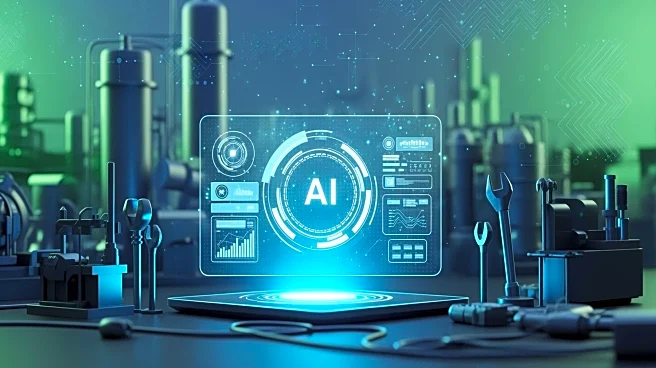What's Happening?
Manufacturers are increasingly adopting AI-powered sales automation to modernize their sales operations, according to a survey by Aleran Software. The survey indicates that 91% of U.S. B2B manufacturers have implemented or plan to implement AI in their sales processes.
This shift is driven by the need to modernize quoting, pricing, and customer interaction processes, which have remained largely unchanged for decades. AI is being used to replace outdated workflows, such as manual quoting and static PDF catalogues, with more efficient systems that can respond faster and scale operations. AI sales assistants are being trained on ERP and CRM data to provide instant technical support, recommend compatible parts, and guide buyers to the right product fit, enhancing the sales process for complex B2B transactions.
Why It's Important?
The adoption of AI in manufacturing sales is crucial as it addresses the challenges posed by supply chain uncertainties, tariffs, and increasing customer demands for speed. By automating repetitive tasks, AI empowers sales representatives to focus on high-value deals and strategic growth, thereby improving efficiency and reducing costs. This technological shift is expected to provide manufacturers with a competitive edge, enabling them to scale operations smarter and faster. The integration of AI into sales processes not only enhances customer experience but also drives measurable ROI, positioning manufacturers to better navigate the evolving market landscape.
What's Next?
Manufacturers are expected to continue integrating AI into their sales operations, focusing on areas that offer the greatest value creation. The next frontier involves agentic AI systems that can autonomously handle multi-step workflows, from generating quotes to verifying credit and triggering production. This evolution from automation to orchestration will further streamline sales processes, providing full visibility for human oversight while enhancing operational efficiency.
Beyond the Headlines
The shift towards AI-driven sales operations in manufacturing highlights a broader trend of digital transformation across industries. As AI technology continues to evolve, it is likely to redefine traditional business models, emphasizing the importance of strategic application over mere adoption. This transformation also raises ethical considerations regarding the balance between human and machine roles in business operations.


















